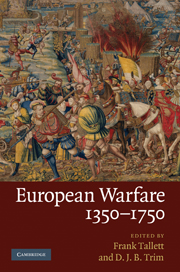Book contents
- Frontmatter
- Contents
- List of figures
- List of maps
- List of tables
- Notes on contributors
- Acknowledgements
- Note on the text
- List of abbreviations
- Maps
- 1 ‘Then was then and now is now’: an overview of change and continuity in late-medieval and early-modern warfare
- 2 Warfare and the international state system
- 3 War and the emergence of the state: western Europe, 1350–1600
- 4 From military enterprise to standing armies: war, state, and society in western Europe, 1600–1700
- 5 The state and military affairs in east-central Europe, 1380–c. 1520s
- 6 Empires and warfare in east-central Europe, 1550–1750: the Ottoman–Habsburg rivalry and military transformation
- 7 Ottoman military organisation in south-eastern Europe, c. 1420–1720
- 8 The transformation of army organisation in early-modern western Europe, c. 1500–1789
- 9 Aspects of operational art: communications, cannon, and small war
- 10 Tactics and the face of battle
- 11 Naval warfare in Europe, c. 1330–c. 1680
- 12 Legality and legitimacy in war and its conduct, 1350–1650
- 13 Conflict, religion, and ideology
- 14 Warfare, entrepreneurship, and the fiscal-military state
- 15 War and state-building
- Bibliography
- Index
14 - Warfare, entrepreneurship, and the fiscal-military state
Published online by Cambridge University Press: 05 June 2012
- Frontmatter
- Contents
- List of figures
- List of maps
- List of tables
- Notes on contributors
- Acknowledgements
- Note on the text
- List of abbreviations
- Maps
- 1 ‘Then was then and now is now’: an overview of change and continuity in late-medieval and early-modern warfare
- 2 Warfare and the international state system
- 3 War and the emergence of the state: western Europe, 1350–1600
- 4 From military enterprise to standing armies: war, state, and society in western Europe, 1600–1700
- 5 The state and military affairs in east-central Europe, 1380–c. 1520s
- 6 Empires and warfare in east-central Europe, 1550–1750: the Ottoman–Habsburg rivalry and military transformation
- 7 Ottoman military organisation in south-eastern Europe, c. 1420–1720
- 8 The transformation of army organisation in early-modern western Europe, c. 1500–1789
- 9 Aspects of operational art: communications, cannon, and small war
- 10 Tactics and the face of battle
- 11 Naval warfare in Europe, c. 1330–c. 1680
- 12 Legality and legitimacy in war and its conduct, 1350–1650
- 13 Conflict, religion, and ideology
- 14 Warfare, entrepreneurship, and the fiscal-military state
- 15 War and state-building
- Bibliography
- Index
Summary
Warfare, economy, and state formation
When historians write about warfare and economy they usually discuss economic causes of war, economic consequences of war, and the importance of economic resources to wage wars. In a medieval and early-modern context, economic forces behind warfare are normally conflicts about trade and colonies. Conflicts between states and the relations between state and society in Europe are themes for political history or historical sociology. Economists and economic historians have normally not been interested in warfare, except its destructive consequences and financial impact on states and societies. Recently, economic historians have become interested in early-modern war finance and state formation, but the military and naval organisations are seldom parts of economic studies.
This lack of interest in military affairs probably has its origin in the fact that economic historians have seen the state and its organisations as central to political history. State formation and war are also central problems for sociologists and political scientists, but they lack the theoretical tools to analyse efficient use of resources. Economics is the social science that is focused on how societies utilise scarce resources, and on causes for economic growth and stagnation. Continuity and change in warfare and organisation of states are important parts of how society utilises resources. As resources are essential in warfare, discussions about war, state, and society require some understanding of concepts used by economists, not as an alternative to political science or sociology but in order to provide balanced explanations.
- Type
- Chapter
- Information
- European Warfare, 1350–1750 , pp. 300 - 321Publisher: Cambridge University PressPrint publication year: 2010
- 3
- Cited by



